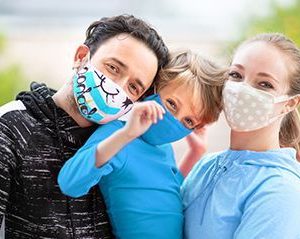- Recognizing the Signs of Hypothyroidism
- 10 Strategies to Overcome Insomnia
- Could Artificial Sweeteners Be Aging the Brain Faster?
- Techniques for Soothing Your Nervous System
- Does the Water in Your House Smell Funny? Here’s Why
- Can a Daily Dose of Apple Cider Vinegar Actually Aid Weight Loss?
- 6 Health Beverages That Can Actually Spike Your Blood Sugar
- Treatment Options for Social Anxiety Disorder
- Understanding the Connection Between Anxiety and Depression
- How Daily Prunes Can Influence Cholesterol and Inflammation
Your Mask Might Also Shield You From Allergies

Here’s a silver lining to having to strap a mask across your face when you go out in public: That mask may also help guard against severe spring allergies, an expert says.
Many patients with spring allergies are doing well this season because they’re spending more time indoors and wearing a mask when they go outside, said Dr. Do-Yeon Cho, an associate professor of otolaryngology at the University of Alabama at Birmingham.
“A study that came out in 2020 showed that allergic rhinitis [hay fever] symptoms among nurses had been significantly reduced with face mask usage during the COVID-19 pandemic,” Cho said in a university news release.
Any type of face covering can significantly reduce the pollens and allergens that may enter your nose and mouth, he noted. However, it’s important not to touch the front side of your mask when removing it and to not flip the mask when reusing it.
Along with wearing a mask, there are other things you can do to reduce spring allergy symptoms.
Identify your allergens and if you’re allergic to spring pollens, limit outdoor activities when pollen counts are high.
“Most weather reports during allergy season give a pollen count,” Cho said. “Using high-efficiency particulate absorbance, or HEPA, air filters during allergy season can reduce exposure to allergens.”
Take allergy medication before pollen season begins to prevent your body from releasing histamines and other chemicals that cause allergic symptoms, he recommended.
Bathe and shampoo daily before going to bed, to wash off pollens.
“Change clothes and wash your nose with saline when you come inside the house,” Cho suggested. “Wash your bedding and clothes in hot, soapy water, and dry your clothes in a clothes dryer, not on an outdoor line.”
He explained that once “temperatures get warmer, dormant trees bounce back to life and release pollen into the air. Some common culprits include birch, cedar and walnut, and the season could last through mid-May.”
Spring showers can wash pollen away and keep it from drifting through the air, but humidity from the rain can cause similar symptoms for people with allergies to dust and mold, Cho said.
More information
The American Academy of Family Physicians has more on allergic rhinitis.
SOURCE: University of Alabama at Birmingham, news release, March 23, 2021
Source: HealthDay
Copyright © 2026 HealthDay. All rights reserved.










